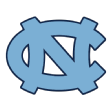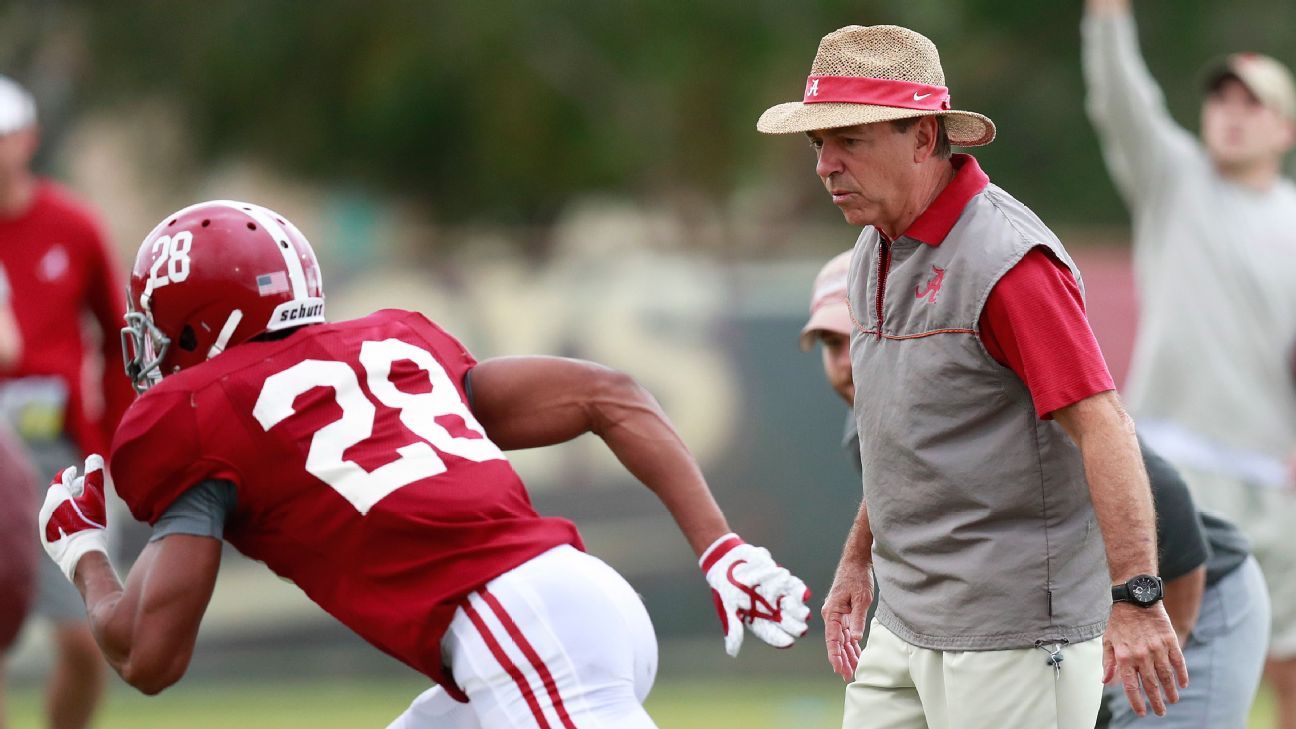Alabama coach Nick Saban was with his wife, Terry, at their home in Boca Grande, Florida, last week during spring break as the coronavirus (COVID-19) news began to flood the airwaves, seemingly changing by the hour.
Like all Americans, Saban was doing his best to come to grips with the new normal in this country, all the while trying to prepare and take the proper precautions with his team and staff to prevent the spread of the virus. Now back in Tuscaloosa, Saban acknowledged he was doing his best to keep from climbing the walls while he’s not out on the practice field like he has been for the past 50 years of his life.
“Anybody who knows me knows I’m not a sit-around kind of guy,” Saban told ESPN. “Drives me crazy to even think about it. But a lot of us in this country are going to have to adjust to doing things differently, and that includes me.”
So instead of roaming the practice field in his customary straw hat, Saban will be working his cell phone and living on his laptop. (On Tuesday, Saban released a video urging fans to practice social distancing.)
“It’s crazy, unlike anything any of us have ever experienced, and we need to remember that it goes a lot deeper than just football and sports that are impacted,” Saban said. “Our world has been turned upside down. You just figure out the best way to manage what you can do. There’s nothing else you can do.”
College football programs all across the country are forced to get creative with how to maintain a sense of normality when life is now anything but. Coaches who by nature crave routine have been delivered a fastball of chaos and are trying to remotely keep their players on track with everything from daily nutrition to workouts and grades.
Several schools in the SEC, including Alabama, had hoped to use video conferencing and other technology such as Zoom to do a virtual spring practice and workouts with players. But even that’s on hold for the time being, as SEC presidents and chancellors voted to suspend all athletic activities, including practices, meetings and other organized activities, through April 15.
“None of us know what’s going to happen after April 15,” Saban said. “We’ll stay connected, the coaches, and work on next year’s opponents and stay in as close touch with our players as we can and keep recruiting as best we can.
“We’ll do the best we can with what we’ve got, and I’m sure it’s going to keep on changing.”
— Chris Low
Here’s a look at how things are changing in college football, based on interviews with ESPN, in alphabetical order:
Jump to: Baylor | Boston College | Duke | Michigan State
Minnesota | Nevada | UNC | Oregon State | Temple | Texas A&M | Virginia

First-year coach Dave Aranda has been driving between his home in Baton Rouge, Louisiana, where his wife and three children are, and Waco, Texas, where he just closed on a new house and is starting his first season as head coach at Baylor. His entire staff is spread across the country, at home with their families, and the players are in the same situation.
“We’ve got a player within each position group who’s going to be the leader,” Aranda said. “He’s going to make sure that if he’s in Dallas and one of his teammates is in Houston, they’re communicating, ‘Hey we’ve got this run, or we’ve got this lower-body workout, let’s hit it.’ I’m going to be doing that, too. Once per day, I might hit the O-line group. The next day I’ll hit the receiver group and just try to check in and see how those guys are, not only their lifting and running and the football part but just how things are going, family and everything else.”
Baylor was on spring break when the news of cancellations broke, so the staff’s operations personnel had to break down the team into groups of 10 to determine where everyone went.
“There were some guys who were in Florida, there were some guys who were in Mexico, some guys went to New York, so we’re having to deal with all of that,” Aranda said, noting that nobody in the program has reported any symptoms of the coronavirus. “It’s kind of scary once you see it.”
“As an administrator or someone that’s in charge of a lot of people, you better know what’s going on, and you better take every rumor seriously and you better take every statistic seriously and you better be applying that to how you’re leading the people around you.”
Minnesota coach P.J. Fleck
Players were also stranded without iPads and other on-campus items that the staff has been mailing to them. Meanwhile, coaches are remotely forging ahead with installing the new offensive and defensive systems — much of which was accomplished during winter conditioning. Like many schools, Baylor is relying on Zoom, and each position coach is using it to record a meeting the players can later watch and take notes from.
“There’s a program for guys if they’ve got weights, but if you don’t have weights, it’s the Herschel Walker stuff — pushups, situps and running in the street,” Aranda said. “We have a list for that.”
The coaches all have to walk a fine line between making sure their players aren’t overeating and sitting on the couch, and following NCAA rules.
“We have 10 guys we have our eye on, a few linemen who have to lose weight, the rest of them we’re trying to put on weight,” Aranda said. “There’s different plans for them. … They’re taking pictures of their meals and sending it in, as best we can keeping track of what they’re eating, what they’re doing.”
— Heather Dinich

This isn’t how Jeff Hafley envisioned his first spring practice session at BC. The Eagles logged five practices before players and coaches dispersed because of coronavirus concerns.
“They were upset that we had to leave and they felt like we were starting something really special,” Hafley said.
Hafley, a first-time head coach, is now leading staff meetings online every morning from his home. His assistants will hold online meetings with their position groups, all of which Hafley can access, Big Brother-style, if he wants. Starting this week, the Eagles players are receiving daily schedules with meetings soon after they wake up.
“If I click a button, I will pop into a different room,” Hafley said. “I can join their room, crack a few jokes and leave. There’s no spying.”
Hafley doesn’t minimize his concern for the situation. If he were in his third or fourth year at BC, he wouldn’t be as concerned about keeping tabs on the staff or the players. Although every coach is facing a similar virtual reality, Hafley must build relationships and standards and culture without being around his team for at least the immediate future.
“Year 1 for both sides of the ball, for me as a head coach, it’s a challenge not being able to be around the players,” he said. “To build a relationship, you need to be around them. We’ll do the best we can, but there’s nothing like face-to-face teaching. It will put us at as big of a disadvantage as we can be.”
Hafley trusts his players to attend and absorb all the online meetings. A bigger challenge is maintaining their physical condition, which ramped up in January and continued early in spring practice. The closing of many local gyms adds another obstacle.
“We’re going to have to get creative,” Halfey said. “We’re going to have to turn on ‘Rocky 2, 3 and 4’ and see what Clubber Lang is doing. Hopefully, the weather’s nice and they can do stuff outdoors.”
— Adam Rittenberg

Duke plans to use video conferencing to conduct an online version of spring practice.
“Right now, we can’t meet as a staff,” coach David Cutcliffe said. “The next thing that could happen here is they lock us out of the facility completely.”
Cutcliffe said the plan is to have a short team meeting at 7 a.m. on Zoom. Then the special-teams coach will lead the special-teams meeting, position coaches will meet with their individual players and then the strength coach will meet with the whole team.
“Then,” Cutcliffe said, “we’ll send them to go work out and will check back with them to close out the day and get a nutritional tip and medical tip, and say, ‘OK, guys, you’ve got academics the rest of the day and do a great job,’ and we’ll try to continue to monitor what’s happening academically the rest of the day. I don’t know any other way to try and do it.”
By last Friday, every Duke player will have had an independent schedule of academics, tutoring and mentoring and then a collective schedule sent to him of what his football responsibilities are that particular week.
“I told our coaches that I plan on engaging them on Saturday some,” Cutcliffe said. “Even though we have great kids, I don’t think you just leave them alone to do whatever they’re going to do all weekend.”
With Duke classes online for the rest of the semester and the players not returning to campus any time soon, Cutcliffe said the football program is putting a shipment together to send players items such as exercise bands and anything else they couldn’t take with them from a technology standpoint.
“We’re sending cleats. We’re sending footballs to those who need them, and the online classes at Duke are going to be in their regular slotted times, so we’re going to have a regular schedule as if we were practicing,” he said.
Cutcliffe said he plans to keep close tabs on his players thanks in part to the Teamworks app, which was created by a former Duke player, but most of all he wants to make sure he keeps the players as engaged as possible during this time away.
“It’s the most unique thing in our lifetime,” Cutcliffe said. “I think probably other than World War II, which was completely disruptive, it’s a whole different era. There’s no previous experience. What my mind went to was 9/11. We were getting ready to play Vanderbilt at Ole Miss and none of us had a reference point on what to say to our players or what to expect tomorrow. And this, even though we’ve seen it coming, is maybe worse as to what’s coming tomorrow.
“What we do know is that we can control our attitude, and one day at a time, we can do a good job with the circumstances we have.”
— Chris Low

The hub of Michigan State’s football operation is a three-bedroom rented townhome about 15 minutes from campus. The office/den includes a desk and a chair, and a foldout table recently purchased from Lowe’s. A Peloton recently arrived. There’s a laptop, an iPad, a TV, a printer, an Amazon Alexa and some cell phones.
And surge protectors. Mel Tucker made sure to get those, too.
Tucker is living and working here alongside his wife, Jo-Ellyn, their sons Christian and Joseph, and two 100-pound white Labradors: King Julian (K.J.) and Prince Jackson (P.J.). A coach who signed a six-year, $33 million contract with Michigan State last month isn’t exactly living large or luxurious, but he’s making it work.
Watching film w/ King Julian & thinking about our team.
Stay positive. Stay safe. Stay focused.
Keep washing🤲🏾Keep distancing 🚶🏾♂️#GoGreen #RELENTLESS pic.twitter.com/jhW8Vr4uQO
— Mel Tucker (@Coach_mtucker) March 16, 2020
“It takes what it takes, man,” Tucker said with a laugh. “I believe in neutral thinking, trying not to judge the situation but just taking it for what it is, and then deciding what’s the next step.”
Michigan State was scheduled to begin spring practices this week. Although Tucker had a few weeks in the office with his staff, he’s now using Zoom and other programs to connect with coaches and players. Tucker is prioritizing time with the current players, especially since he was hired so recently.
“How are the guys doing? Are they safe? Do they have enough food to eat? Are they making smart decisions?” Tucker said. “The football part is really secondary. It’s really the well-being of the players. We’re learning our players now, being a new staff. We talked about being intentional about that on a daily basis: They get a lot of information on their phones, so whether it’s the Zoom app or texts, calls, FaceTime, whatever it is, just being very, very intentional about that.”
Tucker is embracing technology as much as possible. Michigan State has interviewed several distance-learning companies and assessed the best software to transmit information to players and test them on schemes.
“Everyone is resilient,” Tucker said. “Guys are resilient, guys have a relentless attitude, a relentless mindset. I feel we’re going to come out of this thing stronger on the other side of it. When the time is right, we’ll get back to work, we’ll get back on the field, we’ll get back to hard work.
“I’m looking forward to that day.”
— Adam Rittenberg

Confined to his home in suburban Minneapolis, P.J. Fleck is spending time reading books and watching movies. The Flecks are preparing for the arrival of a new pet, a 2-pound Maltipoo named Bella. Fleck also has spent more time cooking with his wife, Heather.
He’s in charge of meats and recently made his first grocery run “in years.”
“There is no toilet paper out there,” he said. “You always think that’s a rumor, and then you go see it, and there is none. You see there’s no bread on the shelf. And then the meat department, the other day, there was no chicken at the grocery store. But then it’s kind of fun because you get some stuff, maybe some lamb chops and things you normally don’t have, and you make it fun.”
Fleck thinks it’s important for coaches to enjoy the extra time around their families, while being mindful of the sobering reason they’re away from their teams. He has never been a live-in-the-bubble coach, spending much of his time on non-football topics to craft Minnesota’s holistic philosophy for its program. You might have heard of “Row The Boat.”
Fleck’s big-picture approach allowed him to create several “emergency plans” weeks ago, not knowing how severe the virus would be or what teams would be allowed to do. He continues to track the updates.
“I’m not saying, ‘Turn it off. I don’t want to see it anymore,'” he said. “I’m in charge of so many other people’s future, their livelihood, their children, their sons. I want to be plugged in, I want to know what’s going on. One of the things right now is being able to decide what are the facts and what are rumors. That’s really big for everybody to get our hands around, but understand how dangerous this is, and how big of a threat it is.
“As an administrator or someone that’s in charge of a lot of people, you better know what’s going on, and you better take every rumor seriously and you better take every statistic seriously and you better be applying that to how you’re leading the people around you.”
Like many staffs, Minnesota holds staff and unit meetings online daily. Coaches are focusing on creative recruiting approaches at a time when there’s no contact with prospects and the spring recruiting period is very uncertain.
Fleck also wants to ensure players are safe, not just from the virus but also from home environments that pose different perils. While their return to football is on hold, Fleck wants players focused on what’s happening around them.
“You have something way bigger than football going on in our lives that’s very dangerous and is a true, true threat,” he said. “That’s where our program kind of helps. They see the big picture. They don’t just see it through football’s eyes and say, ‘When am I getting back?’ They see how this isn’t about them. It’s about how they affect other people, not just serving and giving but how this whole world has to work together to defeat this virus. We need each other, and I think our team is seeing that.”
— Adam Rittenberg

You know things are serious when Nevada shutters its casinos. But Nevada coach Jay Norvell doesn’t need state orders to understand the danger of the coronavirus.
His wife, Kim, has cystic fibrosis, a life-threatening condition that impacts her lungs.
“Her immune system just can’t be compromised,” Norvell said. “It’s not something we can bring that virus home to her. I take it really seriously. I’m just hoping that our younger guys do. We’ve got a lot of people who are young and healthy. They’re not as vulnerable, but they can be carriers.
“We all have to have a pause here in our normal lives.”
Norvell plans to conduct all team business online for the next few weeks. Players have left campus. The Wolf Pack, who were set to open spring practice March 24, have no idea when they will reconvene, and Norvell doesn’t expect clarity for at least a month.
Players are receiving training regimens from Nevada’s strength coach — mostly pushups, sit-ups and other “old-fashioned” exercises.
“It’s very unsettling for a football coach,” Norvell said. “Our mentality is to be working with our kids and constantly pressing them and challenging them to be the very best they can. So we’re constantly working on buy-in.”
Norvell’s concerns go beyond physical training. As a Group of 5 school, Nevada has less support staff than Power 5 programs to assist with e-learning and other non-football areas.
“What do we do with kids that are academically challenged? What do we do with kids that need mental health support?” Norvell said. “That’s where we get stretched as a program because we don’t have the resources that Power 5 programs have. We try to take up the slack as coaches and meet our kids where they have those needs. Those are things that we’re trying to be creative on and try to help our kids as much as we can.”
— Adam Rittenberg

Earlier last week, on the first day UNC was supposed to start spring football, coach Mack Brown was in his office with about two other members of the football staff.
“It’s a real empty feeling,” he said, “but we’ve got to figure out how to navigate it.”
Brown, who is entering his second season at UNC, said there are only about five players from the team who are still living on campus; everyone else is home with their families. That means the football program has to mail each of them checks for their food because they’re on scholarship.
“But restaurants are closing down, and a lot of grocery stores don’t have available what they would want, so our nutritionists are trying to be creative and help the kids as well,” Brown said. “Right now there is a place to eat on campus and they can go any time they want, but that’s if they’re on campus. If they’re off campus, we would give them money for their meals.”
Brown said there will be no in-person staff meetings, but they are using Zoom to communicate as a staff. There is also a leadership committee of players he will meet with regularly through video conferencing.
As of last week, Brown said, four or fewer players could work out in the Tar Heels’ weight room or rehab in the training room, but added, “It’s all voluntary and can’t be more than four at a time.”
Brown said the team nutritionist and strength coach have divided the team and reached out to every player. The assistants and academic counselor for every position have been working with the position coach and players to “make sure everyone is on the same page academically.”
“And then you’ve got another issue,” Brown said. “You try to find out, ‘Where are you? Do you have internet access? Because if you don’t, you can’t use Zoom. Are you safe? Can you work out?’ Because now the high schools are closed, most of the gyms are being shut down, so our strength coach has to send them a workout for a weight room and he also has to send them a workout where they don’t have weights available.”
— Heather Dinich

The gravity of the coronavirus outbreak reached Oregon State coach Jonathan Smith the same way it did most sports fans.
“It hit me when the NBA postponed the season,” Smith said. “I was like, ‘Wow, this thing is real.’ It felt like 48 hours after that, everything got postponed or canceled. We had a practice schedule that got canceled.”
Oregon State held four spring practices before the cancellation, which coincided with the start of final exams (Oregon State was wrapping up its winter term) and then spring break. Smith is now working from his home in Corvallis, while spending his days making calls, FaceTiming with staff and players, writing letters and handling all business remotely.
The program has contingency plans if spring practices aren’t made up, or if assistants can’t conduct their normal late April/May recruiting, which usually puts them in 6-10 schools per day. Smith is entering his third season, and his staff remained mostly intact from 2019, so there aren’t new schemes to implement.
But after losing starting quarterback Jake Luton and others, Oregon State will have to wait on some of its key offseason questions.
“You had position battles and position development you were hoping to take place,” Smith said. “We had 11 newcomers to the roster who were getting to start spring ball. Were they going to be contributors or not? All these questions now, we don’t have them resolved. And not knowing when we’re going to find that out, unless we’re just counting, if August camp still takes place. It’s just way later.
“That piece I think about a decent amount.”
— Adam Rittenberg

Coach Rod Carey has his offensive staff in his basement, while his wife and two kids are upstairs doing homework, and the defensive staff is working at coordinator Jeff Knowles’ house.
“We’re going to go four days a week,” Carey said, “and really what we’re doing is calling our players, we’ve got workouts out to them, every day bodyweight stuff and conditioning, and we’re going to check in with them, and then academically, really we’re academic advisors right now. … And then we’re going to game plan and recruit, and we’ll be done around 1:30, 2 o’clock every day. We’ve got a lot of young kids on our staff.
“I told the guys, ‘Guys, you gotta be home to help your wife, because if your wife has to deal with the kids all day long, she’s going to be pulling her hair out, too. You’ve got to get home and be a dad during this time.'”
Carey said his coaches are also using Zoom, and on Fridays he will have about three members of the recruiting staff at his house, and then will do his evaluations of prospects.
Meanwhile, he’s also trying to keep his own kids happy and healthy.
“Get the Cornhole out!” he said, laughing.
— Heather Dinich

One of the last things Jimbo Fisher did before all of Texas A&M’s football facilities were closed down was have an elliptical machine, rowing machine and dumbbells up to 60 pounds moved to his home in College Station.
For Fisher, social distancing doesn’t mean he’s going to forego his workout regimen.
“I’m making calls all day, been on the phone all morning recruiting and getting in as many workouts as I can,” Fisher said while knocking out a workout on the elliptical.
“Had it on Level 8, too, but that’s good. I’m just trying to stay busy. I’m going crazy. It’s about to drive me nuts.”
Fisher isn’t sure when he will return to the Texas A&M football offices, and the same goes for his coaches. He had the Aggies’ tech people upload anything and everything on his laptop.
“Got all of our opponents for next year on there, studying all of the new defensive coordinators we’ll be facing, everything,” Fisher said. “I’m breaking them all down.”
Fisher said some of the players are still in College Station and others are at home. The players on campus are still able to come pick up their meals for takeout.
“We touch base with them, checking on them and making sure everything’s good,” Fisher said. “We were on spring break [March 9-13], so some have stayed here. They can’t work out in the weight room. They can do something on their own, but we’re not organizing anything. They can go jog by themselves. Really, before I say a whole lot to them, I’m letting this week play out. There’s just so much unknown.”
There’s one thing that Fisher has continually reminded himself, his coaches and his players.
“I know we as football coaches struggle with this sometimes, but let’s keep things in perspective a little bit,” Fisher said. “What’s most important is stopping the spread of this virus.”
— Chris Low

Virginia held zero practices before the NCAA and ACC shut down the sports world as we know it. Coach Bronco Mendenhall admits it wasn’t exactly great timing considering the Cavaliers have to replace their star and leader, Bryce Perkins. But those X’s and O’s are not top of mind. At least not yet.
Mendenhall and his staff sent their players home with a daily schedule to try to keep everything as “normal” as possible. The new normal for Mendenhall includes a much shorter commute to work — a one-minute walk from his back door to his pool house, where he set up a makeshift office with everything he needs, including computers, his game film and a big-screen television.
There is a daily staff meeting via Zoom conferencing, but also time to spend with his family, and plenty of ways to practice social distancing, too. When Mendenhall moved from Provo, Utah, to Charlottesville, Virginia, four years ago, he and his wife purchased a 30-acre ranch they dubbed “HB3” for his wife, Holly, Bronco and their three sons.
“It’s become UVA operations central right now,” he said.
Mendenhall built a roping arena on the property for his sons, who love rodeo. Every day around 5 p.m., he makes the short commute back to the house, changes into his cowboy clothes and rides with his three boys for two hours. Then it’s back to making recruiting calls before going to bed and repeating the same routine.
There’s no telling when everything will return to normal, and that’s why Mendenhall has thought of every contingency he needs to prepare for during his time working from home.
“We’re making preparations as if we won’t have spring practice, that we possibly won’t have players here for summer school, and possibly we won’t have the opportunity for anything other than fall camp to begin and knowing fall camp timing might even be pushed back,” Mendenhall said. “Meaning that there certainly could be a chance it’s not even a full schedule played this year if football is played, period. So I’m willing to expand and look at that vision as far as possible, saying, ‘OK, what if there’s no football this season or what if there’s a modified season or what if all we can do is start in fall camp?’ So we’re making preparations the best we can for any and all scenarios.”
— Andrea Adelson
